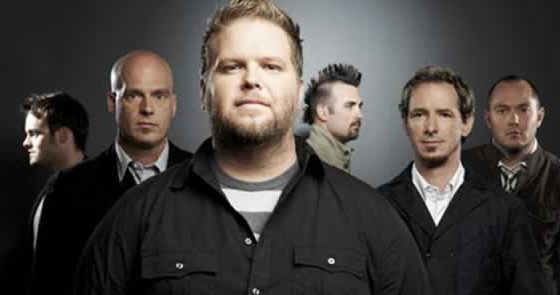You notice two things about Ricky McKinnie when you first meet him. First he is a good looking man. The second thing you notice as the conversation unfolds. He is a positive and caring individual. I met him at his Toronto hotel room a few hours before Blind Boys of Alabama were scheduled to perform in concert at one of Canada’s premier venues Massey Hall. McKinnie is the drummer for the legendary gospel group. He looks debonair sporting a grey goatee. Today he is dressed in a tank top and you can see that he is a well built man.
It is McKinnie’s positive attitude combined with his faith that sustained him when in 1975 glaucoma took his sight away. He says, “I never think about being a blind person. I never sit back and think about being a sightless person. My motto is I’m not blind, I just can’t see. A lot of people want to know what does that mean. When you are blind you have no direction. I am well directed and I am on my way up.”
Although McKinnie has only been with the group seventeen years (only?) he believes the group’s legacy has been, “We have shown the world that a disability doesn’t have to be a handicap. It is not about what you can’t do. It’s about what you can do. People are encouraged and inspired to find their way back to God because they realize nothing is impossible. The only thing they have to do is believe and you will receive. That is the reason why the Blind Boys of Alabama is as popular as they are today. God has shown favor on the music of Blind Boys of Alabama.”
McKinnie says the reason for the group’s longevity is no secret. “If you want to be Biblical about it the Bible says, “If I (Christ) be lifted up I will draw all men unto me. That is what happened to the Blind Boys of Alabama. We have been out there singing the gospel and carrying the good news. God is just doing what He said He would do. He said, ‘If you will be faithful over a few things He will make you master over even greater things.”
The original group got together in 1939 and until last year’s passing of George Scott still had three of the original members. The two remaining active members are Clarence Fountain and Jimmy Carter. The original Blind Boys were referred to as The Five Blind Boys of Alabama. In addition to Carter, Fountain and McKinnie today’s Blind Boys of Alabama consists of Joey Williams, Bobby Butler, Tracy Pierce and Bishop Billy Bowers.
“My mind has always been open to go wherever the Lord will send me. The first album that I recorded on my own was called “Here I Am”. The main statement was, ‘I will go anywhere that You want me to go and I will do anything that you want me to do.’ Here I am today doing what I am doing,” he says chuckling.
Prior to joining the Blind Boys of Alabama McKinnie had a successful career drumming for The Gospel Keynotes of “Jesus You’ve Been Good To Me” fame. He says fondly of the experience, “We did a lot of good things with that group.”
It was following his tenure with The Gospel Keynotes and while he was engaged in a solo career that McKinnie received a telephone call from Blind Boys of Alabama founding and still active member Clarence Fountain. McKinnie maps out the connection for me, “I had an opportunity to play with the Blind Boys back in the seventies when I was on the road with another group out of Texas (The Gospel Keynotes).” He picks up the story again, “They (BBA) were getting ready to go to Australia and needed somebody to play drums and sing background. He (Fountain) asked me if I would mind doing it. I went to Australia. Then I helped them on and off. Here I am today,” he says.
McKinnie’s southern charm extends to his describing the cross pollination of Blind Boys of Alabama’s music in recent years. “We don’t mind singing songs with people who don’t sing in the same genre as us. It’s just like having dinner, you have the vegetables, the meat, the salad and you have desert. It all goes together to make one big meal,” he says laughing. The group has performed and recorded with people such as, Robert Randolph and The Family Band, Aaron Neville, Peter Gabriel, Prince and Aretha Franklin. McKinnie says the Blind Boys of Alabama’s ability to perform with other artists makes it possible for their music to be heard by a much broader audience. He notes that despite primarily being a gospel group the singers’ ability to adapt to other genres of music has provided them with an opportunity to reach out to people from all walks of life. “When you show people that you are not just all one side, just a gospel group, you are not just a Blues artist, you aren’t just a Jazz artist but you’re an artist and the Blind Boys are artists,” he says.
Despite opportunities such as recording with Jars of Clay and contributing music (“Nothing But The Blood”) to a Michael W Smith movie “The Second Chance” the Blind Boys of Alabama have not forgotten why those opportunities exist. “Whenever we talk about doing a song we listen to the words of the song. Every song has a message and the messages in those songs are positive,” he says.
Since it was February and we were celebrating Black history month I posed a question to McKinnie concerning the importance of today’s musicians of color remembering their heritage. Although his answer included the importance of remembering that the roots of gospel music rest with those who were enslaved his answer was much more encompassing than I expected. He believes that much of the music we enjoy in the United States owes its existence to the African American presence in the church. He says, “It is important to know that without the church none of this might ever have happened.”
For their part Blind Boys of Alabama were recognized in 1994 for their contributions to music. They were presented with the NEA National Heritage Fellowship which is awarded to, ‘Artists whose contributions, primarily through teaching, advocacy, organizing and preserving important repertoires, have greatly benefited their artistic tradition.’ (www.nea.gov/honors)
Today McKinnie wears two hats with Blind Boys of Alabama. He also acts as the tour manager. If that doesn’t keep him busy enough he also has a radio program that airs every Sunday morning from nine to ten am on WYZE in Atlanta.
As our time together drew to a close he said something that best sums up the way Ricky McKinnie lives his life, “If you can dream the dream, keep the faith and work the work everything is going to be alright.”
Then the man with the great big warm heart handed me his business card and said, “If there is ever anything I can do for you write or phone me.” It wasn’t so much what he said but how he said that made me respect this southern gentleman even more.
Photo credit: Henry Diltz.
Copyright © 2006 Joe Montague, exclusive rights reserved. This material may not be redistributed without prior written permission from Joe Montague. Joe Montague is an internationally published freelance journalist / photographer.











